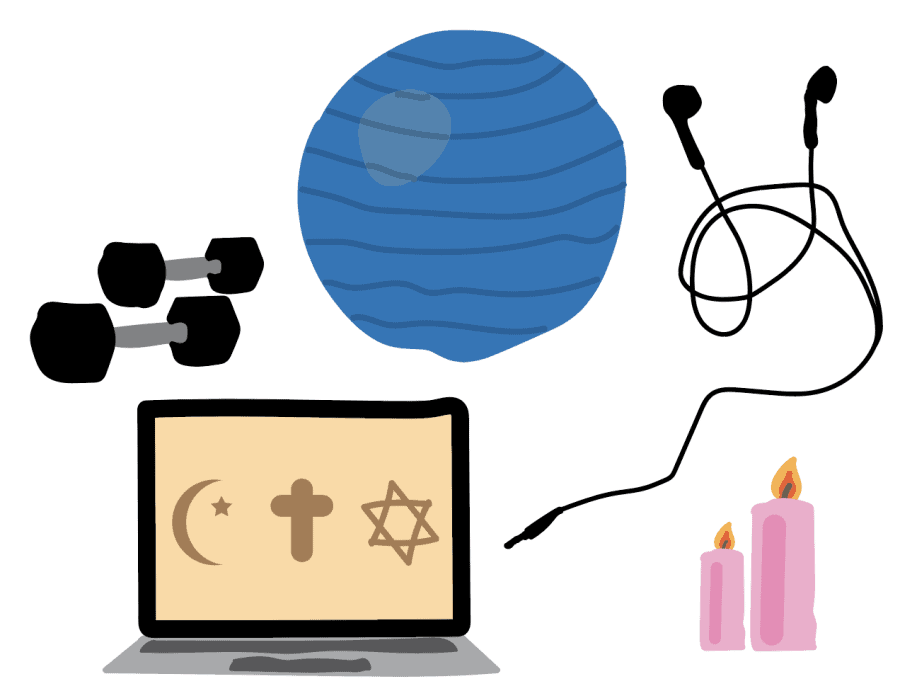Coping with COVID-19 means staying healthy by staying in
August 20, 2020
In the spring, many students only went weeks between hearing about COVID-19 for the first time and being sent away from campus because of it. In compliance with the Center for Disease Control and Prevention (CDC) guidelines, students finished the semester remotely and lost out on socializing with their friends. The adjustment was hard on many students’ mental and physical health, and despite everyone returning to campus, the challenges to regaining a healthy lifestyle are still present.
In an effort to make the upcoming semester both successful and familiar, the University has put strict measures in place. Everyone must wear a mask and social distance whenever possible. Classes will be offered in three different styles depending on the number of students: face-to-face, online and hybrid. Every student, faculty member and staff member must test negative for COVID-19 upon arrival and update the school at least every three days through Healthcheck.
Luckily, there are additional ways to ensure you’re maintaining a healthy lifestyle.
Physical Health
“There are concerns therefore that, in the context of the pandemic, lack of access to regular sporting or exercise routines may result in challenges to the immune system, physical health, including by leading to the commencement of or exacerbating existing diseases that have their roots in a sedentary lifestyle,” according to a recent article from the United Nations.
While the pandemic may keep you from training at the gym or going on a hike with a group of your friends, there are plenty of other safe ways to stay both physically active and socially distant.
- Find at least one hour a day to exercise. This can mean going on a walk around your neighborhood or finding a path to walk on, all while wearing your mask, of course.
- Find an online workout class that fits your level of experience. YMCA 360 has a plethora of workout classes tailored to all ages and fitness levels. While you might not feel motivated to work out alone in your house, there are plenty of ways to virtually workout with others. You could host a workout class with a group of friends over Zoom, or follow an online workout video.
- If safe in your area, get one or two friends and go on a social distance walk. Going on a walk with friends you know have been following COVID-19 guidelines is a great way to catch up with each other while sneaking in a workout.
There’s always a way to get exercise on campus. The Quad is a popular venue for runs or walks – just remember to grab your mask.
Mental Health
According to the CDC, the stress surrounding the pandemic can lead to the development of mental health issues such as anxiety and depression. While being home with your family or roommates may be comforting at first, being with the same group of people can provoke feelings of irritability and annoyance over time. One contributing factor to poor mental health is social media, where some people turn when stripped of the freedom to leave their homes.
It is possible to alter one’s mindset while being stuck indoors by taking time for oneself and finding peace in the quiet.
- Take one to two hours each day for yourself by finding a quiet space and performing an activity that would clear your mind. A popular method is practicing mindful meditation. In an interview with the Mayo Clinic, counselor Kristin Lothman stated that “Mindfulness is about paying attention on purpose to the present moment”, and that she believes “mindfulness is a powerful tool we can use right now.” Sitting by yourself for that long may seem like an impossible task, yet it may bring more peace and clarity to your mind and state of being.
- Go for a drive. Wherever you’re going, the key is to go alone and with a playlist of your favorite songs. The music will act as a calming agent and allow you to focus on your surroundings rather than what is on your mind.
- Talk to an outsider who you trust about what may be troubling you. While you may not wish to burden others with your problems, having a support system gives you the ability to let out whatever is on your mind, and ultimately leave you with a clear headspace.
A free online self-help module is available to students through their MyBama account. This includes Thrive Campus, a website that evaluates and connects students to an outside counselor or provider. Beginning the week of Aug. 31, the counseling center will also be holding virtual support groups throughout the upcoming semester.
Spiritual Health
The pandemic drastically impacted places of worship, unsettling routines and leaving some congregants with no way to worship corporately. While some places of worship pivoted to virtual services or limited seating, some spiritual people may miss the experience of attending a live service.
There are still a number of ways to stay spiritually connected during the quarantine.
- Find services online. Having the option to watch a service online can even give you the opportunity to experience a service you might not be able to regularly attend because of location.
- Join a virtual small group. This is the perfect way to stay in touch with friends during a time of uncertainty while continuing spiritual growth and development.
- There are a multitude of books tailored to one’s spiritual growth. Two excellent ones to start with are “The Alchemist” by Paulo Coelho, and “The Untethered Soul: The Journey Beyond Yourself” by Michael A. Singer.
There are several organizations available on campus that are tailored to every denomination. Find a list here.








